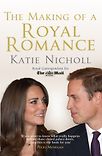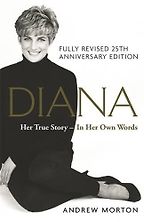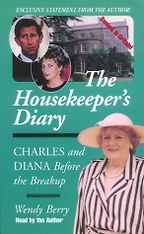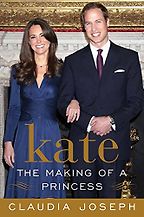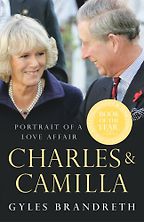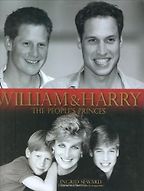Before we talk about your books, what do personally find so fascinating about the royals?
I think it’s the fact that they have been born into such an extraordinary life that they have had no choice over. William and Harry are very normal and grounded, regular boys, despite having grown up in the goldfish bowl of royalty. I think the struggle for them to have to find that balance of the public and private life is fascinating. I think we are so lucky in Britain to have the royal family that we do. They are great ambassadors for the country and their lives and relationships and loves and histories are just so colourful and rich in texture. William and Kate are a real-life fairy tale.
What are some of the things that you have found out about them that particularly surprise you?
The thing that really surprises me is how normal they actually are and how able they are to have normal lives. I think that is largely because both of them have chosen to have military careers. William lives in a regular farmhouse cottage in Wales. He and Kate can just choose what they want to do and keep it behind closed doors. They can go walking, they throw dinner parties, and they spend their evenings watching DVDs. They might go to the cinema. It’s wonderful that they have managed to do this and I think it’s largely down to their mother who really broke the mould. Generations before that have never been able to enjoy that kind of life.
Let’s move on to your first choice, which is Andrew Morton’s famous biography Diana: The True Story.
This is a book that was familiar to me from the start because it was so famously serialised. I read it during a holiday to the South of France the summer before I started writing my book because I knew that it was going to be an invaluable way in to understanding the Princess of Wales. I think you cannot begin to write a book about William and Harry without understanding their mother because there is so much of their mother in them. And I surprised myself by how much I actually enjoyed reading it. It felt a little bit like a guilty pleasure.
It is not necessarily the most beautifully written book but it is packed with so much colour and information which enabled me to understand Diana at probably the most difficult time of her life. This was during the lead up to her separation and she was a woman who was so desperate to make her marriage work. But, of course, she didn’t stand a chance because Camilla had always been on the scene.
There are those immortal words – in her Panorama interview with Martin Bashir: ‘Well, there were three of us in this marriage, so it was a bit crowded.’
Yes, exactly. And I think this book really provides a valuable insight into Diana and what was going on and the impossible task she faced of being married to a future king who had a mistress who was the one he really loved. Morton also has some fascinating snippets in the book about William and Harry and he also talks about the boys.
What kind of impact do you think the split had on the boys?
I think Harry was largely protected because he was the youngest and he was still at Ludgrove. But I think it had more of an impact on William because he was aware of what was going on and that is something that Morton looks at. Diana really used William as a confidante and invested a lot of her emotions in him and I think that must have weighed very heavily on William. He took on a lot for such a young boy who had always been so carefree and happy. I think that changed his character. And, of course, you have to remember that, even though lots of children have parents who get divorced, this was being played out so publicly. When his mother gave that famous Panorama interview on the BBC he was teased and it was a humiliating experience for him. I talk in my book about the fact that he really never actually forgave his mother for it. She had embarrassed the whole family and it had made life very difficult for him. Simone Simmons, a complementary therapist and confidante of Diana, who I interviewed for my book, said it was the one time they really fell out. It took a while for William to really get over that.
I am not surprised. Well, next up is The Housekeeper’s Diary by Wendy Berry, a book that was banned in Britain.
When it said banned in Britain on the cover I knew it was a book that I had to read. It wasn’t easy to get a copy. I think it may be out of print but eventually I managed to track one down. Wendy Berry was the housekeeper at Highgrove and Kensington Palace for many years and most importantly during the break-up of Charles and Diana’s marriage.
I found the book to be really compelling reading. I devoured it within a day. It was full of fascinating colour and really great anecdotes. I particularly like the story about how Diana and Charles tried to keep the pretence of the marriage going as much as they could by pretending they were sharing a marital bed. Diana would leave her earplugs in Charles’s bed.
Also Wendy was more than aware that when Charles wasn’t around James Hewitt would visit Highgrove regularly, and although the guest bedroom was made up and he made a big effort to ruffle the sheets it was fairly obvious he hadn’t slept there! Reading this was all very interesting.
But she also paints a very vivid picture of the princes’ young lives – and tells how Charles gave them baths and put them to bed. This shows he was a much more hands-on father than many people previously thought. That was interesting to find out. She portrays quite a domestic picture of life at Highgrove and I think there were times when Charles and Diana were happy and the children were happy. They rode their ponies; they loved joining their father in the garden. Of course, Diana was never really a country girl but I still think there were happy times there and the book exposes that just as much as the other things she writes about.
Which is good to know, because things are never all black.
No.
Your next book takes a look at Kate Middleton, with Kate: The Making of a Princess by Claudia Joseph.
You do have to wade through this book to get to the love story of William and Kate but actually this book is far more useful as an historical reference to Kate Middleton’s past. The author has gone right back to the 19th century to trace Kate’s roots and reveal that Kate’s mother had come from really very working-class stock. She has coal-mining ancestry in Durham. Her father came from a wealthy textile family up in Leeds. So he and his brother inherited a lot of money and that was interesting because that explained quite a lot of Kate’s background. For example, all the children, James, Pippa and Kate, went to private schools and no one could understand how that happened because, yes, the Middletons’ business, Party Pieces, was doing well but surely not well enough to send three children to private school?
Do you get the sense there is genuine concern among the royal family about Kate’s background?
No, I don’t think the royal family are concerned at all about Kate’s background. I think they are able to see the merits of marrying a commoner rather than landed gentry or aristocracy. And actually I think that could do the royal family a lot of good because it is bringing someone into the fold who has a background of coming through working-class roots and self-improvement. She is in touch with middle England.
What do you make of her?
I met Kate at the palace on the day of the engagement and that was really the only formal meeting I have ever had with her. All the other encounters have been socially and at nightclubs where Kate has always been very guarded and very careful about what she has said. She has always been polite and terribly nice. I suppose the reason that she has so much credibility in the royal family is because she has never spoken. When we met her on the engagement day she was absolutely charming and I was struck by how confident she was. She was meeting a select number of the world’s press for the very first time, which is enough to inspire fear in most people. But she really took everything in her stride and she just seemed very at ease.
She told me she was nervous but she didn’t look nervous. She was thoroughly charming and very regal, just in the way that she held herself and conducted herself and I was really impressed.
She sounds like good news. Your next choice is Charles and Camilla, Portrait of A Love Affair by Gyles Brandreth.
I wanted to read this book because I think Charles is so misunderstood. I dipped in and out of Jonathan Dimbleby’s biography. But I think what Gyles Brandreth does in his book is bring these stories right up to date. He also looks in detail at Camilla. I think there are so many misjudgments made on Camilla’s character and in his book he paints a picture of quite a fun woman who obviously captured Prince Charles’s heart many, many years ago. He goes into quite some detail about that meeting. For me the most important thing I took from the book is how fundamental Camilla is to Charles. He is a happier prince with Camilla in his life.
And surely, the important thing is that William and Harry seem to like her, which is telling, considering the impact she had on their mother?
Absolutely. One of the things I have explored in detail is the boys’ relationship with Camilla, which isn’t always easy. And Gyles also touches on it. Harry was particularly suspicious of Camilla. He just didn’t know what to make of her because of course he had always heard Diana and then his nanny being quite uncomplimentary about Camilla. But William was the one who was very keen to meet her and forged a strong friendship with Camilla. I think both boys are close to her. I don’t think the shadows of the past and Diana weighs on that relationship at all. I think they have accepted Camilla for what she is.
Let’s finish off with your final choice, William and Harry by Ingrid Seward.
This is really the predecessor to my book. Ingrid talks about their early lives and in my book I talk about the later years when I spent time with them and partied with them and witnessed their coming of age. But I did need to understand their early childhood and I do think that Ingrid Seward probably has the best detail on that. She had some lovely stories from Ludgrove. She recounted the time that William was accidentally struck with a golf club and the dramatic trip to the hospital in Reading and then down to London. She also talks about how the split took its toll on William particularly, and that was interesting.
How did that help you?
The boys’ early childhood has, of course, impacted on their adult lives, so learning about their schooldays was very important.
What about when you came to do the research for your book, because it is a notoriously closed shop where close friends won’t talk – how did you manage to do your research?
The inner sanctum will never speak – Thomas van Straubenzee, Guy Pelly, Tom Inskip, James Meade and the Van Cutsems. These are the friends that William and Harry have had for life and they are notoriously discreet but there is an extended circle and they can be more inclined to talk. I know William was worried when he heard that my book was coming out because there was information he didn’t want to come out. There were stories that I managed to uncover. For example, his first girlfriend was Rose Farquhar, a summer fling that they had managed to keep secret for 15 years. I think they were quite surprised when I lifted the lid on this.
But I think it is all in how you tell a story. My book is actually very warm towards both of the boys and towards Kate. It is not a muckraking exposé. It is really just a portrait of their lives and I don’t think that anyone has been too upset.
And have you had any feedback from the princes?
I have been told that no one is displeased with it!
And they don’t give you the evil eye when they see you?
No, thank goodness! Sometimes Harry has a cheeky comment to make on something he’s read in the column but they have never been unkind to me.
April 29, 2013. Updated: November 11, 2020
Five Books aims to keep its book recommendations and interviews up to date. If you are the interviewee and would like to update your choice of books (or even just what you say about them) please email us at [email protected]
Support Five Books
Five Books interviews are expensive to produce. If you've enjoyed this interview, please support us by donating a small amount.
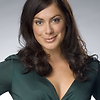
Katie Nicholl
Katie is Diary Editor and Royal Correspondent for The Mail on Sunday and the author of royal biography The Making of a Royal Romance. Over her decade-long career she has interviewed every A-list star and broken many front-page scoops – even Prince Harry has admitted to reading her weekly column. In conjunction with her successful print career she is also a freelance broadcaster and regularly appears on Sky News, ITN the BBC and ABCand CNN in America.

Katie Nicholl
Katie is Diary Editor and Royal Correspondent for The Mail on Sunday and the author of royal biography The Making of a Royal Romance. Over her decade-long career she has interviewed every A-list star and broken many front-page scoops – even Prince Harry has admitted to reading her weekly column. In conjunction with her successful print career she is also a freelance broadcaster and regularly appears on Sky News, ITN the BBC and ABCand CNN in America.

